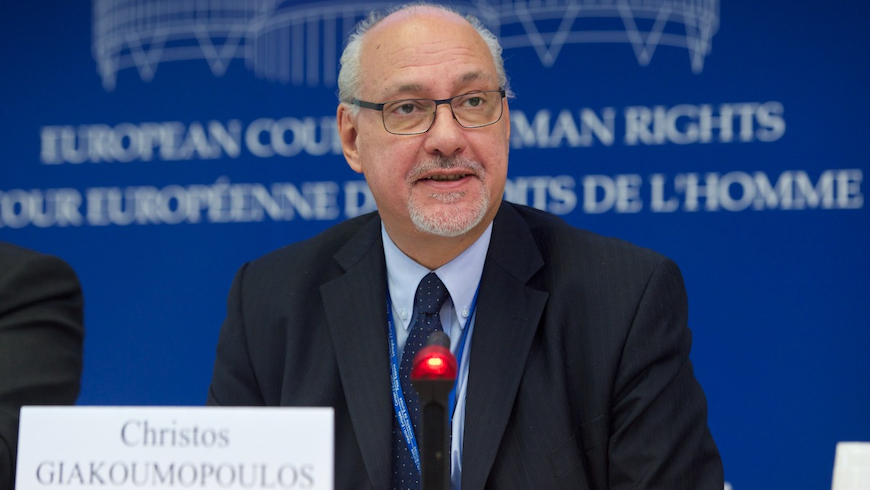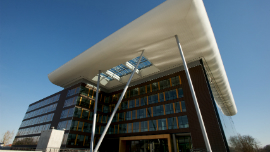Speech by Christos Giakoumopoulos
International Conference on “Prevention and management of conflicts of interest among judges and prosecutors and judicial safeguards in the fight against corruption - Implementation of the Council of Europe standards in Russia”
17 April 2019, Moscow
Excellences, Colleagues, Ladies and Gentlemen,
I am delighted to be here in Moscow once again for this International Conference. I say “once again” because it is the second time in the past 6 months that I come to Russia. And I do so with pleasure as Russia is and remains an important member state of the Council of Europe.
During these visits and the many meetings and bilateral contacts I have had, I could see how important the Russian contribution is for the Council of Europe, but also the extent to which the Council of Europe has helped make improvements to the Russian legal and regulatory framework. The Council of Europe-Russia relation is in effect a “win-win” relationship for both sides.
This event is no exception. It highlights the impact GRECO – our anti-corruption monitoring body and one of the key Council of Europe monitoring bodies – made to the Russian anti-corruption framework. GRECO President and other speakers will discuss this more in details, but suffice it to say that new Anti-corruption Strategies and national Plans were elaborated, new committees established, many new laws were introduced and even more amended, including the Criminal Code, the Administrative Offences Code and the Labour Code.
I am very glad that the Russian authorities placed emphasis on the important topic of conflicts of interest at this meeting. Conflicts of interest can arise in multiple shapes or forms; and they can affect anyone. However, they are not automatically a crime. They may become one if they are not properly managed. Hence, the heavy emphasis placed by GRECO on the preventive aspect of the fight against corruption.
Some people think that preventive measures are weak and that the only way to deal with corruption is through enforcement and criminal law measures. Yes, when corruption offences occur and are proven, people should go to jail. This is essential to maintain the effectiveness of the criminal justice response to corruption. That said, when this happens, it means that our preventive barriers have failed. It means that we have let slip through the net a situation that, if properly managed, could have avoided the occurrence of a corruption offence.
GRECO has consistently issued recommendations to all its 49 member states to address and manage real or perceived conflicts of interest in the public sector. I look forward to listening to the discussion later today about the steps taken by Russia in this context.
Ladies and Gentlemen,
This event does not take place in isolation. It is part of a week devoted to the Council of Europe, to Russia and to our core Human Rights work. And this is not an accident. Corruption erodes Human Rights and may lead to Human Rights violations. I would venture as far as saying that countries with a poor Human Rights record are also likely going to have high corruption levels.
One of the first mentions of close links between corruption and Human Rights can be found in the Declaration of Human and Civic Rights proclaimed by the Great French Revolution on 26 August 1789, and I quote:
“The representatives of the French People, (…) considering ignorance, forgetfulness or contempt of the rights of man to be the only causes of public misfortunes and the corruption of Governments, have resolved to set forth, in a solemn Declaration, the natural, unalienable and sacred rights of man (…)”
Of course, there was still a long way to go between this declaration of rights and their enforcement in courts; however, it was an important point of principle made almost 230 years ago, which remains highly relevant today; this is how the European Convention on Human Rights comes into play in anti-corruption activities.
First, respect for the European Convention on Human Rights is one of the reasons why we fight against corruption at the Council of Europe. As noted earlier, corrupt practices may lead to Human Rights violations. A clear example of that is the European Court’s case-law which repeatedly found violations of the right to a fair trial in cases where national judges of different countries were affected by conflicts of interest. There are many such examples which convincingly show that fight against corruption is an indispensable element of States’ obligations under the ECHR and you will hear more about them later today.
But there is a second important link between the fight against corruption and Human Rights: those who are suspected or prosecuted on account of corruption activities do also have their rights under the ECHR: the right to be treated with dignity, the right to presumption of innocence, to an independent and impartial tribunal, to private life, etc. There have been cases before the Strasbourg Court where the fight against corruption, however legitimate in itself, has led to human rights abuses of those who were prosecuted for corruption.
This is why – and I want to emphasis this point - there can be no legitimate and credible fight against corruption without respect for Human Rights.
Ladies and gentlemen,
Let me conclude. Advances in international cooperation are not made at a rhyme of a tweet or a headline. For international cooperation to be effective and for changes at a national level to be sustainable, time and patience are of the essence. After all, it was Tolstoy who once famously wrote that “The strongest of all warriors are these two — Time and Patience”. And I can’t agree more.
70 years of peace and stability could only reign in Europe thanks to the perseverant, yet quiet work that the Council of Europe has been pursuing. We have accompanied societal changes, we have helped build or restore democracies, we have developed an arsenal of legal norms - not of weapons, we have addressed and resolved individual grievances through the case-law of the Strasbourg Court. But our job is not over. It is with the same patience and perseverance that we embark on a new journey for the next 70 years: a journey in which Russia has its full and rightful place on board.
Thank you very much for your attention.




